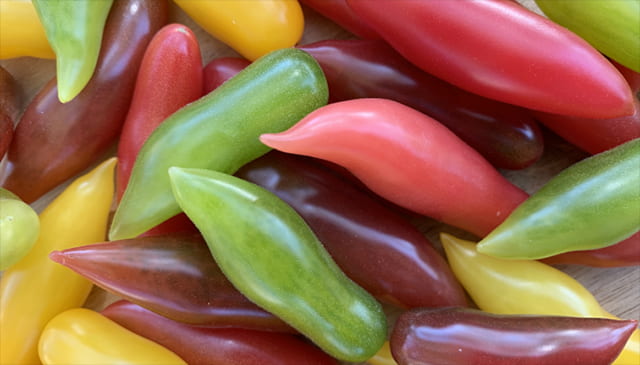
In case you missed it, the Spring 2020 issue of CALS Magazine (.pdf version) is loaded with articles featuring innovative and impactful research and teaching efforts by faculty in the Horticulture Section and other faculty in the School of Integrative Plant Science:
Genetic ingenuity: What does it take to put produce on your plate? details how Phillip Griffiths, associate professor of horticulture, has been developing chili pepper tomatoes that come in seven different colors. His other edible inventions include a Galaxy Suite of heirloom tomatoes and new varieties of cabbage, kale and radishes. The story also tells how associate professor of plant breeding Michael Mazourek broke through the anonymity barrier to forge a new model for how unique vegetable varieties can gain more visibility by partnering with Manhattan chef Dan Barber and grower Matthew Goldfarb to co-found Row 7 Seed Company. Mazourek’s specialties include squash, peppers, cucumbers and snow peas. It also describes the successful releases of SnapDragon and RubyFrost apples from the breeding program of Susan Brown through Crunch Time Apple Growers, a cooperative open to all growers in New York state.
‘Just Food’ course broadens students’ perspectives of food systems tells how Rachel Bezner Kerr, professor in the Department of Global Development, and Frank Rossi, associate professor of horticulture teamed up to create a course designed to challenge students’ perspectives of controversial and nuanced issues, such as meat production, genetically modified crops and prevailing malnutrition. The class regularly takes students to spaces where they can witness parts of the food production pipeline first-hand. “The excursions provided a tangible example of the global food system in diversity and scale,” says Rossi.
CALS strengthens NYC connections with new grant projects describes how Jenny Kao-Kniffin, associate professor of horticulture and Jonathan Russell-Anelli, senior lecturer and senior extension associate in the Soil and Crop Sciences Section built a team to create applied solutions to current challenges in urban agriculture, including food availability, individual and community health, environmental contamination and economic opportunity.
New specializations accelerate growth of MPS programs tells how Charles Gagne, MPS ’19 decided to switch career paths and found the CALS Master of Professional Studies (MPS) program to be the perfect catalyst. He graduated with a degree in horticulture and a specialization in controlled environment agriculture and recently landed an apprentice grower position at BrightFarms, a company based in the Hudson Valley.
Researchers develop market for East Coast broccoli updates the effort started in 2010 with the goal of growing a $100 million broccoli industry in the eastern United States in 10 years. Currently valued at around $90 million, researchers say they are on schedule to make their mission happen. One of the challenges stems from the fact that broccoli was originally cultivated for Mediterranean climates, so growing it in the Eastern U.S. confuses the plant’s developmental cues. But over the years, Thomas Björkman, professor of horticulture and project director and his collaborators identified the genetic markers needed to grow a more uniform-looking plant in the Eastern climate.
Digital agriculture workshop highlights radical collaborations tells how associate professor of horticulture, Justine Vanden Heuvel and collaborators are developing soft robots armed with high-resolution sensors that perform ultrasounds on the growing grapes that can detect things like differences in sugar content, berry firmness and fungal spores of such dreaded pathogens downy mildew and powdery mildew.
Among the many answers to the question How can we protect New York state’s berry industry?, professor of horticulture Marvin Pritts has been researching how to grow strawberries under low tunnels with stunning results, including extending the harvest season through November. He has also developed systems for growing delicate raspberries and blackberries in high tunnels. Associate professor of horticulture Courtney Weber is working to develop varieties with the best combination of traits for New York and Northeast growers. “Cornell’s varieties are grown all over the world,” says Pritts. “The work we’re able to do for New York is significant, but it’s only part of the picture. People from all over come to us for information. The impact we’re able to have is really broad and wide and deep. ”


